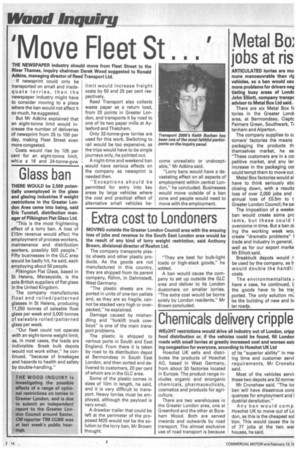Extra cost to Londoners
Page 12

If you've noticed an error in this article please click here to report it so we can fix it.
MOVING outside the Greater London Council area with the ensuing loss of jobs and revenue to the South East London area would be the result of any kind of lorry weight restriction, said Anthony Brown, divisional director of Roehm Ltd.
The company transports plastic sheets and other plastic products. As the goods are not manufactured in this country, they are shipped from its parent company, Rohm, in Dahmstadt, West Germany.
"The plastic sheets are imported in units of one-ton pallets and, as they are so fragile, cannot be stacked very high or overpacked," he explained.
Damage caused by mishandling and "forklift truck cowboys" is one of the main transport problems.
The plastic is shipped to various ports in South and East England. From there it is taken by road to its distribution depot at Bermondsey in South East London, and then sorted and delivered to customers, 20 per cent of whom are in the GLC area.
Some of the plastic comes in sizes of 10m in length, he said, and it is very difficult to transport. Heavy lorries must be employed, although the payload is very small.
A drawbar trailer that could be left at the perimeter of the proposed M25 would not be the solution to the lorry ban, Mr Brown thought. "They are best for bulk-light loads or high-stack goods," he added.
A ban would cause the company to set up outside the GLC area and deliver to its London dustomers on smaller lorries. "The extra cost would be borne solely by London residents," Mr Brown concluded.
















































